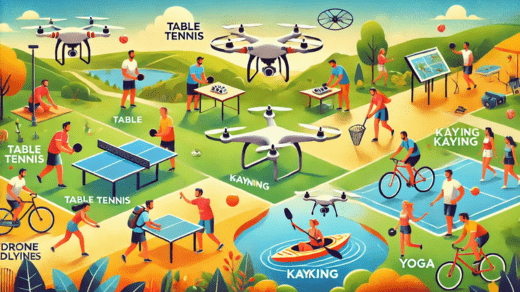
The entertainment industry has undergone a dramatic transformation over the past two decades, fueled by rapid advancements in technology and shifts in consumer preferences. With the rise of digital entertainment platforms, traditional forms of media are being replaced by more interactive, on-demand, and personalized experiences. This article explores how these changes are shaping the future of entertainment, with a focus on the key trends and innovations driving the industry.
The Shift from Traditional to Digital Media
For decades, traditional media like television, radio, and print were the primary sources of entertainment. However, the rise of the internet and digital technology has led to a major shift. Audiences are increasingly moving from conventional platforms to digital services like YouTube, Netflix, and Spotify, where they can access a vast array of content at their fingertips.
This shift has been facilitated by the growth of high-speed internet, the proliferation of smartphones, and the availability of affordable streaming devices. Digital platforms offer viewers the flexibility to watch, listen, and engage with content whenever and wherever they want, fundamentally changing how entertainment is consumed. The convenience and accessibility of digital media are key factors in this transformation, allowing consumers to bypass traditional channels and choose content based on their preferences.
Current Entertainment Trends and Their Impact
Several current trends are reshaping the digital entertainment landscape. Live streaming has emerged as one of the most significant developments, with platforms like Twitch, YouTube Live, and Instagram Live offering real-time access to events, gaming sessions, and influencer content. This shift toward live streaming is driven by consumer demand for more interactive and immediate experiences.
Another notable trend is the rise of interactive content, where viewers actively participate in the entertainment process. Video games have long been interactive, but platforms like Netflix have embraced interactive storytelling with series like “Bandersnatch,” allowing viewers to make decisions that affect the storyline. This trend is expanding across various entertainment mediums, with more personalized and engaging experiences on the horizon.
The impact of these trends is clear: the digital entertainment industry is moving towards more immersive, flexible, and real-time content. As consumer demands for greater interaction and customization increase, businesses must adapt quickly to meet these needs.
The Role of Technology in Shaping Entertainment Experiences
Technology is playing a pivotal role in shaping the future of entertainment. Virtual reality (VR) and augmented reality (AR) are two key innovations creating entirely new experiences for consumers. VR platforms like Oculus and PlayStation VR offer users the chance to immerse themselves in digital worlds, whether it’s for gaming, movies, or live events. These technologies allow audiences to experience entertainment in ways that were previously unimaginable.
AR, on the other hand, is enhancing real-world experiences by overlaying digital content onto the physical world. Apps like Pokémon Go have already demonstrated the potential of AR in gaming, and this technology is now being explored for everything from interactive advertising to live sports broadcasts.
As these technologies continue to evolve, they will redefine how consumers engage with entertainment. We can expect even more seamless and interactive experiences, driven by advancements in AI, machine learning, and 5G connectivity.
Consumer Preferences Driving Innovation
At the heart of the digital entertainment revolution are changing consumer preferences. Today’s audiences are looking for more personalized, on-demand content that fits into their busy lifestyles. Streaming services like Netflix, Hulu, and Disney+ cater to this demand by offering a vast library of content, with algorithms that recommend movies and shows based on individual preferences.
The rise of mobile devices has also changed how entertainment is consumed. Viewers no longer need to sit in front of a TV or computer screen—they can now enjoy content anywhere, whether on the go or in the comfort of their home. This flexibility has made it easier for people to integrate entertainment into their daily routines, further driving the shift from traditional to digital media.
Consumers are also seeking more interactive and immersive experiences, which is pushing companies to innovate in ways that go beyond passive viewing. The demand for personalized and engaging content is pushing the industry toward more tailored offerings, with platforms using AI and data analytics to provide unique experiences for each user.
Future Predictions for the Entertainment Industry
Looking ahead, the entertainment industry will continue to evolve, driven by both technological advancements and changing consumer expectations. One of the most significant trends will be the increasing integration of artificial intelligence (AI), which will enable platforms to create even more personalized experiences. AI could also play a role in content creation, automating parts of the filmmaking and music production process.
Virtual and augmented reality are expected to become more mainstream, allowing users to participate in fully immersive experiences. As 5G networks become more widespread, the quality of these experiences will improve, enabling faster streaming, better graphics, and more responsive interactions.
Additionally, subscription-based models are likely to continue growing, with more consumers opting for services that offer flexibility and cost-effective access to a wide variety of content. However, as competition in the digital space increases, platforms will need to find innovative ways to retain subscribers and offer unique content.
In conclusion, the rise of digital entertainment platforms is transforming how we consume media, with technology and shifting consumer preferences leading the charge. The entertainment industry is becoming more personalized, interactive, and immersive, with advancements in VR, AR, and AI paving the way for the next generation of entertainment experiences.



